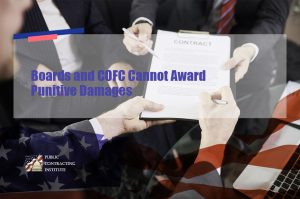
ultant A recent case from the Armed Services Board of Contract Appeals (“ASBCA”) reminds us that the ASBCA, the Civilian Board of Contract Appeals, and the Court of Federal Claims cannot award punitive damages to a contractor. The recent case is John Shaw LLC d/b/a Shaw Building Maint., ASBCA Nos. 61379 and 61585, Nov. 29, 2018. Before discussing the Shaw case, let’s consider the types of damages that the Federal Acquisition Regulation (“FAR”) sets forth. In general, the FAR speaks of three types of damages, or amounts that may be claimed by a contractor or a government contracting officer”
- Compensatory (actual) damages. Generally this amount is considered an “equitable adjustment” for a change or other situation under the Changes clauses, FAR 52.243-1 to 5 and contractors have the burden of proving their actual damages;
- Liquidated Damages, which are discussed in FAR subpart 11.5, and are used primarily in construction contracts where the extent or amount of damages for late delivery or performance would be difficult or impossible to estimate accurately or prove; and
- Punitive Damages, which are awarded when a defendant acted with “recklessness, malice or deceit; specifically, damages assessed by way or penalizing the wrongdoer or making an example of others.” Blacks Law Dict., 10th Ed. (2014, Thomson Reuters). The Department of Energy Acquisition Regulation mentions punitive damages as “not allowable unless the act resulted from specific terms of a contract or written instructions from the contracting officer.” DEAR 952.231-71.
Shaw had a janitorial contract to furnish personnel, equipment and supplies at an Air Force Base. Among his other claims, Shaw sought $409,000 for punitive damages caused by a failure to timely pay two invoices, which resulted in financial hardships for his company, such as failure to financially secure future contracts, a sale of certain equipment and withheld payments on other contracts. The Army moved to dismiss the punitive damages claim, citing the ASBCA’s lack of jurisdiction.
The Board cited Janice Cox d/b/a Occupro Ltd., ASBCA No. 50587, 01-1 BCA ¶ 31377 as stating that “[a]bsent express consent of Congress, no punitive damages can be recovered against the United States. Congress has never expressly consented to the Board awarding punitive damages, and therefore the ASBCA has no subject matter jurisdiction.” Accordingly, the Board struck the matter from the docket (dismissed it). Two other points are worth noting.
First, the Court of Federal Claims has no jurisdiction to grant punitive damages. See 28 U.S.C. Sec. 1491(a) as well as Mastrolia v. United States, 91 Fed. Cl. 369, 382 (2010), which explicitly states that the COFC lacks authority to grant punitive damages. Second, The authority of both the ASBCA and the CBCA is set forth in the Contract Disputes Act, which states that “[A]n agency Board may grant any relief that would be available to a litigant asserting a contract claim in the United States Court of Federal Claims.” 41 U.S.C. § 7105(e)(2). Therefore, the ASBCA, the CBCA and the COFC are three forums where punitive damages are not available.
For other helpful suggestions on government contracting, visit: Richard D. Lieberman’s FAR Consulting at https://www.richarddlieberman.com/, and Mistakes in Government Contracting at https://richarddlieberman.wixsite.com/mistakes/.
Other Articles on the Boards of Contract Appeals
IGNORING A BOARD ORDER: FAILURE TO PROSECUTE
Don’t Make a Fatal Mistake at the Boards of Contract Appeal
Boards Cannot Grant Injunctive Relief
Boards and COFC Cannot Award Punitive Damages
Filing Notice of Appeal at the Boards: Simple

